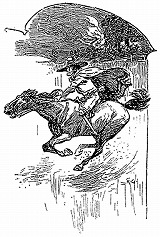“Well, I was never in luck’s way long. Suddenly, without a note of warning, the great mutiny broke upon us. One month India lay as still and peaceful, to all appearance, as Surrey or Kent; the next there were two hundred thousand black devils let loose, and the country was a perfect hell. Of course you know all about it, gentlemen - a deal more than I do, very like, since reading is not in my line. I only know what I saw with my own eyes. Our plantation was at a place called Muttra, near the border of the Northwest Provinces. Night after night the whole sky was alight with the burning bungalows, and day after day we had small companies of Europeans passing through our estate with their wives and children, on their way to Agra, where were the nearest troops. Mr. Abel White was an obstinate man. He had it in his head that the affair had been exaggerated, and that it would blow over as suddenly as it had sprung up. There he sat on his veranda, drinking whisky-pegs and smoking cheroots, while the country was in a blaze about him. Of course we stuck by him, I and Dawson, who, with his wife, used to do the book-work and the managing. Well, one fine day the crash came. I had been away on a distant plantation and was riding slowly home in the evening, when my eye fell upon something all huddled together at the bottom of a steep nullah. I rode down to see what it was, and the cold struck through my heart when I found it was Dawson’s wife, all cut into ribbons, and half eaten by jackals and native dogs. A little further up the road Dawson himself was lying on his face, quite dead, with an empty revolver in his hand, and four sepoys lying across each other in front of him. I reined up my horse, wondering which way I should turn; but at that moment I saw thick smoke curling up from Abel White’s bungalow and the flames beginning to burst through the roof. I knew then that I could do my employer no good, but would only throw my own life away if I meddled in the matter. From where I stood I could see hundreds of the black fiends, with their red coats still on their backs, dancing and howling round the burning house. Some of them pointed at me, and a couple of bullets sang past my head: so I broke away across the paddy-fields, and found myself late at night safe within the walls at Agra.

“As it proved, however, there was no great safety there, either. The whole country was up like a swarm of bees. Wherever the English could collect in little bands they held just the ground that their guns commanded. Everywhere else they were helpless fugitives. It was a fight of the millions against the hundreds; and the cruellest part of it was that these men that we fought against, foot, horse, and gunners, were our own picked troops, whom we had taught and trained, handling our own weapons and blowing our own bugle-calls. At Agra there were the Third Bengal Fusiliers, some Sikhs, two troops of horse, and a battery of artillery. A volunteer corps of clerks and merchants had been formed, and this I joined, wooden leg and all. We went out to meet the rebels at Shahgunge early in July, and we beat them back for a time, but our powder gave out, and we had to fall back upon the city.
“Nothing but the worst news came to us from every side - which is not to be wondered at, for if you look at the map you will see that we were right in the heart of it. Lucknow is rather better than a hundred miles to the east, and Cawnpore about as far to the south. From every point on the compass there was nothing but torture and murder and outrage.